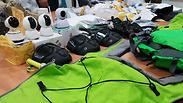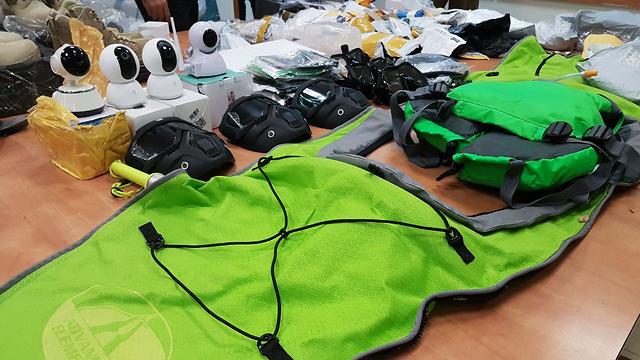
Israel is battling Gaza terrorists on a new front - the post office
In past year, IDF troops have intercepted more than 1,600 items ordered from abroad and destined for the Strip that have been designated as 'dual purpose'; the army's list of banned objects now includes drones, night vision goggles and compasses, and is only getting longer
In the past 12 months, the Gaza office of the Coordination of Government Activities in the Territories (COGAT) has confiscated more than 1,600 items sent to the coastal enclave that are defined as "dual-use items" - products not originally intended for military use but that may be used for attack or intelligence operations.
Five years after its last war with Israel, the military wing of Hamas has become more exacting, more focused and even more surprising.
It is investing considerable resources in psychological warfare, at the expense of real military achievements. IDF Chief of Staff Aviv Kochavi recently defined Hamas as a "terrorist army," as opposed to a terrorist organization.
The decision to use the post office to smuggle items into Gaza is testimony to the change taking place in the military wing. While the items being posted are not rifles or anti-tank missile launchers, they can often cause more damage than live ammunition.
The items do include drones, which can photograph strategic facilities on the Israeli side of the border from the air, and can hurl grenades at IDF troops.
The packages sent by post also contain minute hidden cameras that can be placed on the perimeter fence during disturbances in order to provide intelligence to Gazan snipers or terrorists planning to cross the border.
Other items include encrypted radios and advanced diving equipment – some of the best in the world - for the hundreds of Hamas naval commandos who have made massive advances since their failed mission to infiltrate Israel by sea during the 2014 war.
As time has passed, the list of dual-use items banned by Israel has grown.
At first, the list mainly comprised chemical fertilizer and tunnel-digging equipment, and now includes hundreds of items intended for military use in Gaza: model aircraft; balloons; laser pointers used to blind IDF forces during disturbances; night vision devices that erode the IDF's fighting advantage; masks; helmets; military footwear; high-quality uniforms and compasses.
It also includes technology-based items such as remote-control video cameras, frequency jammers, GoPro cameras, Internet range magnifiers, antennas and more.
Three years ago, Israel eased restrictions on the Gaza population and as a humanitarian measure enabled the residents to order products from abroad, from websites such as eBay and Ali Express.
Like Israelis, Gazans also like to take advantage of low prices and free shipping, ordering brand clothing shoes, handbags, gadgets and other items from China.
The orders usually arrive via ship and are sent for initial inspection at the Israel Postal Service's main sorting centers.
In these centers, parcels suspected of containing dual-use items are marked for the attention of COGAT personnel, who then gather the parcels at the Erez crossing between Israel and Gaza and open each one for inspection.
According to 2nd Lt. Sahar Weiss, an IDF officer at Erez Crossing, the person to whom the package is addressed is informed that their shipment has been confiscated and sent to be destroyed by the Justice Ministry.
"Afterwards, the sacks (of parcels) that continue on to Gaza undergo another inspection. The Gazans who have their shipments confiscated have the right to appeal," Weiss says.
Israel only approved a handful of these appeals against confiscation, and while the shipments to the terrorist organizations have not stopped, there has been a small decline in recent months.
Israel is also currently tracking the fake identities to whom the banned items measures were addressed.
A look at the recipients to whom the suspicious packages are addressed also provides a snapshot of life in the Gaza Strip, which has been almost hermetically sealed for 12 years - there are almost no exact addresses with house and apartment numbers, and most have a general location, such as the Gaza City neighborhoods of Rimal or Zeitun.













